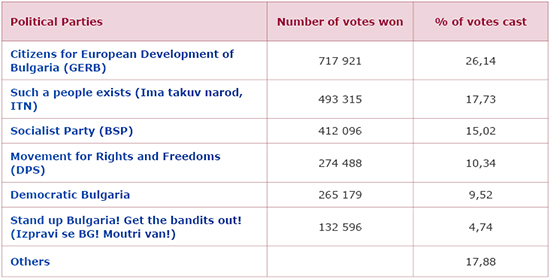Results
Elections in Europe
Corinne Deloy
-

Available versions :
EN

Corinne Deloy
It is hard to say who won the 4 April parliamentary elections in Bulgaria, which were seen as a referendum on Boïko Borissov, the outgoing Prime Minister, who has led Bulgaria since 2009, weakened by several corruption scandals and who had to face numerous demonstrations of discontent in 2020. Although his party, the Citizens for the European Development of Bulgaria (GERB), which ran in coalition with Rumen Hristov's Union of Democratic Forces (SDS), came out on top with 26.14% of the vote, they nevertheless recorded a decline compared to the previous election on 26 March 2017.
The Socialist Party (BSP) led by Korneliya Ninova collapsed: it received 15.02% of the vote and lost its status as the first opposition party, coming only in third place.
The protest parties that led the 2020 demonstrations performed better than opinion polls predicted. This is notably the case of Such a People Exist (Ima takuv narod, ITN), a populist party founded by singer and TV presenter Slavi Trifonov, which came second in the poll with 17.73% of the vote. Placed in quarantine after announcing that he was suffering from symptoms of the coronavirus, the populist leader said, referring to his supporters: "What they have achieved today is important (...) we are the winners. They demand power and change is now inevitable".
The liberal Democratic Bulgaria coalition, which comprises three parties (Yes Bulgaria, Democrats for a Strong Bulgaria and the Greens), won 9.52% of the vote. Its leader, Hristo Ivanov, said: "A new Bulgaria is taking shape" adding "Boïko Borissov can win thanks to administrative and financial pressure but he will not be the dinosaur he was". He does not want to enter the government at any price.
The coalition Stand up Bulgaria! Get the bandits out! (Izpravi se BG! Moutri van!) of former ombudswoman Maya Manolova and the Poisoned Trio (the name given by journalist Sasho Dikov to the trio comprising lawyer Nikolai Hadjigenov, sculptor Velislav Minekov and public relations specialist and former radio journalist Arman Babikyan) with 4.74% of the vote thus enters parliament.
Finally, the Movement for Rights and Freedoms (DPS), a party representing the Turkish minority, led by Mustafa Karadayi, obtained 10.34% of the votes.
In total, six parties will be represented in Parliament.
Bulgarians living abroad voted for the party "Such a People Exist", to which they gave 29.83% of their votes. Among them, the Democratic Bulgaria coalition won 16.81% of the vote; the Movement for Rights and Freedoms, 14.66%; Renaissance, 7.21%; the Socialist Party, 6.58%; Unity for the National Ideal (NIU), 5.28% and finally Rise Bulgaria! Get the Bandits out! 4,27%. Bulgarians abroad were able to vote in 69 countries around the world.
Turnout was low. It stood at 42.83%, which is -11.02 points compared to the parliamentary elections on 26 March 2017. "The vote was marked by a turnout of urban voters and young people," said Boriana Dimitrova, director of the Alpha Research opinion institute. On the other hand, it seems that older voters, many of whom are Socialist Party supporters, preferred to stay at home in the context of the pandemic.
Results of the parliamentary elections in Bulgaria on April 4, 2021
Turnout: 42,83%

Source : https://results.cik.bg/pi2021/rezultati/index.html
"For the fifth time in a row, we have won the parliamentary elections", said Boiko Borissov when the results were announced.
"It is the lack of other options due to a fragmented and unconvincing opposition that explains GERB's political hegemony," said Antony Todorov, professor of political science at the New Bulgarian University. "The results reflect the deep fragmentation of society. There is no clear majority and GERB owes its victory only to the voters' need for stability," said Antony Galabov, professor of political science at the New University.
Although the party of the outgoing Prime Minister finally managed to retain the first place in the election, it is expected to have difficulties in forming a government coalition. The vast majority of the other parties have already indicated that they will not form an alliance with Boiko Borissov. Borissov has called for national unity and has proposed the formation of a government of experts to emerge from the pandemic by December. "I propose peace. You cannot do it alone (...) Let's be united," he said.
Slavi Trifonov has been one of the most outspoken critics of the current government. It is therefore difficult to imagine that he could form an alliance with Boiko Borissov. It is worth noting that Such a People Exist, Democratic Bulgaria and Get Up Bulgaria! Get the bandits out! the forces that took to the streets in 2020 to protest against the current government, together won nearly 100 seats in parliament. However, there is nothing to say that these three parties might agree to govern together.
"The compromise to form a government will be very difficult to find and if the discussions succeed, this government will not last more than a year," said Ognyan Mintchev, director of the Institute of International Studies in Sofia. "We have not seen such fragmentation since the 1990s. We are at the beginning of a long process of transformation," he added.
Indeed, it seems that the most likely scenario after the 4 April elections is the constitution of a minority government led by GERB, which will lead the country until the presidential elections scheduled for next autumn.
On the same theme
To go further
Elections in Europe
Corinne Deloy
—
25 February 2025
Elections in Europe
Corinne Deloy
—
18 February 2025
Elections in Europe
Corinne Deloy
—
28 January 2025
Elections in Europe
Corinne Deloy
—
14 January 2025

The Letter
Schuman
European news of the week
Unique in its genre, with its 200,000 subscribers and its editions in 6 languages (French, English, German, Spanish, Polish and Ukrainian), it has brought to you, for 15 years, a summary of European news, more needed now than ever
Versions :



